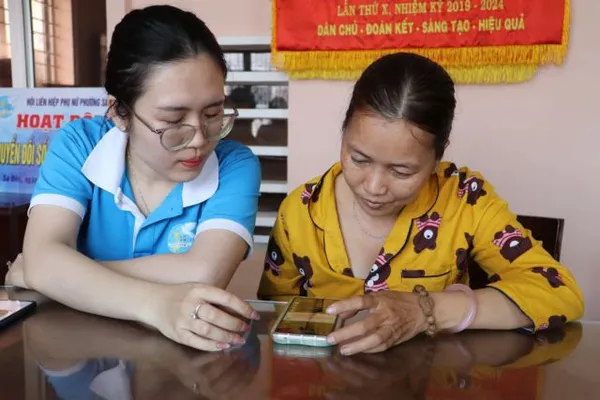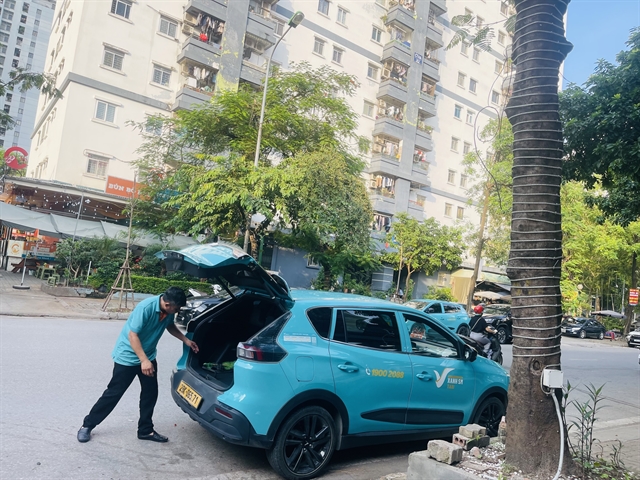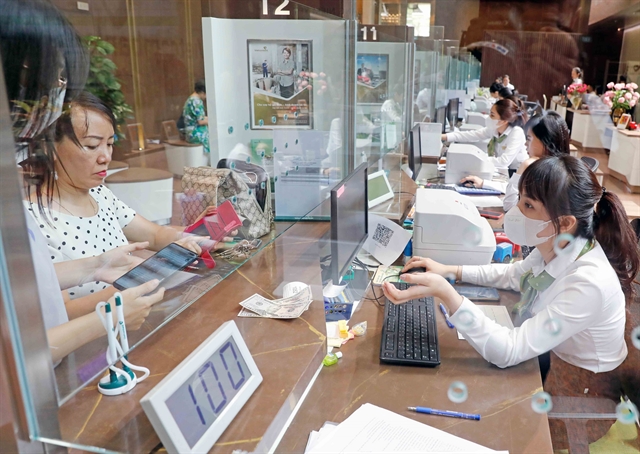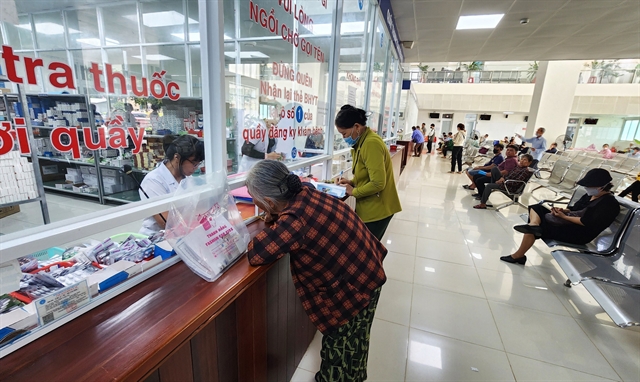 Opinion
Opinion

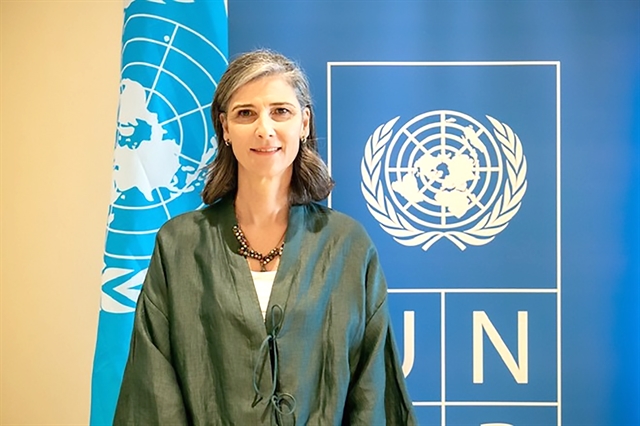 |
| Ramla Khalidi, UNDP Resident Representative in Việt Nam. VNA/VNS Photo |
Ramla Khalidi, United Nations Development Programme (UNDP) Resident Representative in Việt Nam, speaks to Việt Nam News on the UNDP’s role in supporting Việt Nam's vision for "the era of the nation's rise".
How does General Secretary Tô Lâm's vision for Việt Nam's "era of the nation's rise" align with the UNDP's strategic objectives and priorities in the country?
For over four decades, UNDP has supported Việt Nam in the achievement of its national development goals. Today, this means supporting Việt Nam in the promotion of a dynamic and expanding economy. An economy that is inclusive, environmentally sustainable, and effectively governed.
As we move into the second quarter of the 21st century, the challenges Việt Nam faces are increasingly complex, reflecting a world economy that is becoming ever more competitive, interdependent, and dynamic. Geopolitical tensions and uncertainties around trade add a further layer of complexity.
Following several years of slower economic growth, General Secretary Tô Lâm has brought a new energy and urgency to Việt Nam’s socioeconomic development agenda, including the dual goals of becoming a high-income economy and reaching net zero emissions by 2050. During his October meetings with UNDP’s global leadership in New York, the General Secretary notably recognised UNDP’s past contributions to Việt Nam’s development, as well as its potential for future contributions, underscoring the significance of the partnership.
Looking more closely, we see an alignment between many of UNDP’s global objectives and Việt Nam’s development priorities. These include the further reduction of poverty, expanding access to decent work, increasing economic resilience to climate change, strengthening effective, accountable and inclusive institutions, and advancing gender equity across all sectors. Currently, UNDP works with national authorities across many of these policy areas, including the promotion of inclusive economic growth, innovation, digitalisation, climate resilience, energy transition, the rule of law, development finance, and strengthening of essential social services. As Việt Nam embarks on a new development phase, UNDP looks forward to deepening this partnership and addressing the country’s most pressing challenges together.
In what ways can UNDP support Việt Nam in achieving the sustainable development goals outlined in this vision, with a particular focus on environmental sustainability and social equity?
While Việt Nam’s economy has regained momentum, sustaining rapid growth will require deliberate measures to achieve significant transformations across an array of key areas, including institutional reforms, technological upgrading, the movement into higher-value manufacturing and service activities, and long-overdue breakthroughs in the development of private enterprises. All of this will occur within an economy that is and will continue to undergo rapid spatial and socio-demographic transformations, owing to a confluence of factors, including climate change, migration, urbanisation, and population aging.
For Việt Nam to achieve inclusive and sustainable growth in this context, it needs to invest in the development of managerial and technological capacities within and outside the state, develop a green growth model that creates equitably shared benefits for the population, and promote a more open and inclusive governance system. The latter includes further strengthening Việt Nam’s socialist rule of law state, to ensure vulnerable populations can access justice and have their rights protected at a time of rapid – and at times disruptive - transformation.
As Việt Nam’s leaders have pointed out, now is the time for the country to address longstanding bottlenecks in infrastructure and energy, to promote the development of a more skilled workforce, and to develop social policies that better support the socioeconomic security and development capabilities of the country’s population. The recent flurry of activity around the promotion of science, technology, innovation, and digitalisation indicates that there is recognition of the need for swift action across a range of critical fields.
Sustainability, energy transition, and resilience in the face of climate change further illustrate UNDP’s assistance to Việt Nam. In alignment with Việt Nam’s climate commitments under the Paris Agreement, UNDP is focused on promoting Việt Nam’s green energy transition, enhancing natural resources management, and strengthening community resilience. These efforts are essential. To grow its economy sustainably and remain internationally competitive, Việt Nam must rapidly expand its supply of energy from renewable, low-carbon sources, such as wind and solar. While moving toward a carbon net-zero economy by 2050 is an ambitious goal, Việt Nam is well placed to realise it and to become a regional and world leader in sustainable development. Correspondingly, our focus is on how we can support Việt Nam’s efforts in this direction right now.
The transition to green growth requires coordination of transformations across a range of sectors and industries. To diversify and strengthen its energy system, Việt Nam must facilitate the development of green industries, integrate renewable solutions -- such as solar, wind, hydrogen, and energy storage, and make use of other measures – such as carbon taxes and incentives – to promote movement toward a greener economy. To improve its economic performance and sustainability, Việt Nam must undertake the structural transformation of its export-led economy and seek investment from and partnership with firms at the cutting edge of sustainable growth. In infrastructure, Việt Nam requires a more integrated approach to transport and logistics, spatial planning, energy, water management and storm resilient housing. Finally, Việt Nam can seize competitive advantage in the region and beyond by embracing sustainable business models and regulatory practices that will help the country build a reputation for producing increasingly high-quality and sustainable export produces.
While it is impossible to know how this might play out and how Việt Nam’s energy mix will take shape, it is clear Việt Nam must meet its present and medium-term energy challenges, and UNDP is actively supporting the country in expanding, accelerating, and financing its transition to a more sustainable mix of energy sources.
In parallel, Việt Nam must enhance its national preparedness and resilience to climate change impacts. Again, UNDP is well positioned to assist, as was demonstrated in our strong technical leadership and effective coordination in the post-Yagi response effort. Additionally, UNDP continues to assist the government in policy making for green growth strategies, circular economy development and environmental regulations to ensure compliance with international commitments. Finally, to expand and sophisticate its economy in a way that supports and protects the wellbeing of the country’s population, Việt Nam must also develop a 21st century system of social protection and supports, enabling its citizens to both drive and benefit from the nation’s growth. UNDP remains as a strong partner in helping Viet Nam build a future that is inclusive, resilient, and sustainable ensuring that no one is left behind.
What primary challenges does the UNDP anticipate during Việt Nam's transition in this 'rising era'? How does UNDP plan to address these challenges, particularly in fostering digital and green transformations? Could you highlight potential collaborative projects that might help Việt Nam harness these technologies for socio-economic development?
One of Việt Nam’s primary challenges is that it must successfully undertake large-scale economic restructuring while promoting the development of an economy that produces benefits for all of Việt Nam’s people, including those at risk of being left behind, such as rural populations, ethnic groups and labor migrants. There is indeed justifiable optimism in Việt Nam about the country’s economic prospects and increasing indications that Việt Nam’s economic transformation has entered a new era. However, addressing the country’s development challenges will require focused improvements in the inclusive design and implementation of policies that are responsive to diverse needs and vulnerabilities across geographies and populations groups. In the past, development efforts were frequently focused on specific sectors. By contrast, many of the challenges Việt Nam faces today require an ability to address large-scale, multi-sectoral challenges involving multiple domestic and foreign development partners.
State policies must catalyse and coordinate action across sectors and across central and local levels of governance in ways that past policies have sometimes struggled to do. In the field of digital transformation, a whole-of-government approach is needed to steer, finance, incentivise, and support digital transformation across all sectors and at all levels of governance, even as specific aims and challenges of digitalisation will vary across sectors.
UNDP programmes are currently supporting digitalisation in areas such as public administration, social protection, and sustainable environment development and management. Building robust legal and policy frameworks that safeguard the rights of citizens and prevent inadvertent patterns of exclusion, inequality and abuse unleashed by artificial intelligence and new technologies is also critical. The rise of cybercrime, issues around digital privacy, the role of social media in human trafficking and the persistence of digital divides are examples of the risks and threats that will need to be managed to ensure a safe and equitable digital transformation.
With respect to Việt Nam’s green transformation, Việt Nam faces the challenge of diversifying its sources of energy and energy finance but also harnessing domestic sources of finance and ensuring that energy policy benefits all of Việt Nam’s people. UNDP will continue to help Việt Nam develop and monitor policies and work with its international development partners. A good example of this is UNDP ‘s facilitation and coordination role in the Just Energy Transition Partnership– a multi-billion multilateral initiative that aims to assist Việt Nam finance its green energy transition and access technologies. Alongside this, UNDP’s approach includes empowering local communities and women-led enterprises, piloting green technologies and circular economy models, promoting sustainable land-use practices, and collaborating on conservation projects. There are digital aspects, as well. Leveraging digital tools for real-time monitoring of environmental and socio-economic indicators, for example, promotes more effective policy management and accountability.
Could you elaborate on specific programmes or initiatives UNDP is implementing to strengthen Việt Nam's governance and institutional capacities in this new era? How does the UNDP view its role in fostering governmental transparency and efficiency, particularly in addressing issues such as wastefulness and corruption highlighted by General Secretary Tô Lâm?
Sustainable Development Goal 16, which is focused on building effective, accountable and inclusive institutions, is central to UNDP’s partnership with the Government of Việt Nam. Cognizant that sustainable and equitable development cannot be achieved without responsive institutions that deliver for all citizens, UNDP continues to work closely with several government partners at central and provincial level to increase transparency, efficiency and inclusion. Founded in 2009, the Provincial Governance and Public Administration Performance Index (PAPI) is a key example of those efforts. The index measures and benchmarks the performance of provincial authorities in citizen participation, transparency, accountability, control of corruption, public service delivery, and environmental and e-governance. It is the largest social survey-based governance assessment tool in Viet Nam, gathering feedback from over 16,000 citizens annually.
In annually capturing citizen perceptions on local government performance, PAPI provides invaluable data for policymakers and civil servants to strengthen public sector responsiveness and efficiency. Crucially, PAPI allows national and local leaders to gauge how different demographic groups – women, youth, the elderly, ethnic groups, persons with disabilities, migrants – are experiencing governance and where potential gaps may exist.
UNDP also has longstanding programming aimed at advancing the implementation of the UN Convention Against Corruption (UNCAC), ratified by Việt Nam in 2009. Adopting a multisector approach, UNDP supports a wide range of government partners to advance both corruption prevention – for example, through digitisation in service delivery, which reduces opportunities for corruption – and by strengthening law enforcement capacities. Strengthening systems to more effectively manage conflict of interests in the public sector and to bolster authorities’ capacities in asset recovery remain top priorities.
Finally, the National Assembly and Provincial People’s Councils also play an important role in promoting transparency and efficiency. As Việt Nam prepares for the 2026 elections, UNDP is hoping to see a greater number of women representatives, in line with Viet Nam’s National Strategy on Gender Equality and Communist Party Resolution 26-NQ/TW. Across the world, the increased participation of women in politics – especially in parliaments – has been linked to more representative, transparent, and inclusive institutions and in policies that result in a more equitable distribution of resources. UNDP looks forward to working with national partners to enhance the role of elected women representatives to that end.
How does the UNDP plan to monitor and evaluate Việt Nam's progress toward achieving the goals outlined in the vision for the rising era?
Việt Nam’s socioeconomic development goals have many strengths, especially for their commitments to promoting rapid, equitable, sustainable growth. In our work, we regularly collaborate with government partners to better understand the effectiveness of Việt Nam’s development policies. As Việt Nam moves into a new developmental phase, we are working to assess how our own contributions to Việt Nam’s development can best support the country’s success and ensure that the benefits of Viet Nam’s development are widely shared. VNS

